
WWW.ANDRERIEUMOVIES.COM
Day trips
This page is no longer up to date. We lost knowledge of the local bus routes. Sorry!
Things to do and visit in the vicinity of Maastricht.
Maastricht has three train stations, of which the most important is Maastricht Central Station. From
Maastricht central station most international connections go to Belgium (Liège) and national connections to
all parts of the country including Amsterdam and Schiphol (airport). Maastricht has also a bus station, which
is located at Maastricht Central Station. The bus station is divided into two sections: city buses and regional
buses. All buses stop here, as well as the international buses to Belgium (Hasselt) and Germany (Aachen).
Although trains normally represent a faster and cheaper alternative to regional buses, the cheapest option to
the German city of Aachen is bus # 350 (Platform H). Buy tickets from the bus driver.
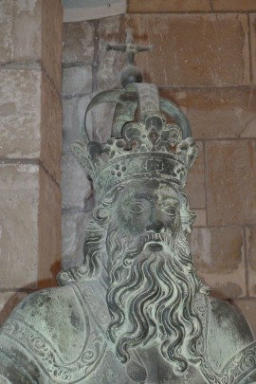
Bus trips through the Limburg country side or to
Aachen (Germany).
If you have time left in between the concerts, a good idea might be
to take a bus from the bus station (next to the Maastricht railway
station). Departure: every 15 minutes.
For instance: Bus # 57 (platform G) will take you to several
beautiful Limburg villages like Slenaken, Epen, Gulpen, Mechelen,
near the Belgium border. Buy a day-ticket and hop on and hop off.
Bus # 350 (platform H) will take you to Aken/Aachen in
Germany (a one hour drive), the city of Charlemagne (Charles the
Great: 747-814). The bus departs four times an hour and on the
weekends twice an hour. Buy tickets from the bus driver. There is
also a bus stop (after 25 minutes) in Margraten (American Military
War Cemetry).

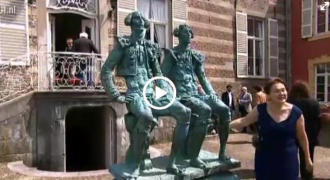
On May 31st 2015, L1mbourgeois broadcast an item
about the Taratynov-family. (Alexander Taratynov
created André Rieu’s and d’Artagnan’s sculpture). The
family has bought the abandoned empty castle
“Strijthagen” in Landgraaf, another Limburg town near
Heerlen (37 minutes by train from Maastricht railway
station, departure is twice an hour). The family restored
the castle and turned it into an art gallery. The interview
with Alexander Taratynov is in English. Click HERE for the
L1 program.
Would you like to visit the
American Military War Cemetry in
MARGRATEN??
It is not too far from Maastricht! Go to the Maastricht
train station. In front of the train station you’ll find the
bus station. Take bus # 350 in the direction of
Aken/Aachen (Germany). Buses depart every 15
minutes from platform H. Buy a bus ticket from the
driver. Exit the bus after 25 minutes at bus stop
Margraten.
CHATEAU ST. GERLACH, PARK, CHURCH.
In 2011 André's statue was here in the park. The country estate and park is worth while a visit. It is open to
the public (for free) in Geulhem/Houthem, near Valkenburg. A stylish baroque garden, a farmhouse herb
garden, a standard-tree fruit arboretum and a rose garden. The baroque garden of the castle-hotel displays
several statues and pieces of art. You can have nice walks from the estate to the romantic Geul river, which
is typical for the Limburg scenery (routes available at the reception desk). It’s a hotel, restaurant, bistro. The
church and the treasury are also open to the public. The history of the estate (former convent) dates back to
the 12th century. You can see a short video about the life of Saint Gerlach (only in Dutch). Take the train
from Maastricht train station, platform 6, in the direction of Kerkrade. The train departs every 15 minutes at
XX.02, XX.11, XX.32, XX.41. It is a 10 minute ride. Exit at the third stop: station Houthem/St.Gerlach. Turn
to the left and walk to the estate. There is a nice brasserie/terrace to have a drink, lunch or dinner. You
could also take a taxi from Maastricht (and ask the driver to stop in the village of Geulhem, for the cliff
dwellings).
GEULHEM. If you go by car: The address for your navigation system is: Joseph Corneli Allee 1, 6301 KK
Valkenburg. Coming from Maastricht you'll pass a few cliff dwellings in the village of Geulhem. In early days,
people who extracted sand stone from the hills lived there. That's how the caves of Valkenburg were made.
Visiting the caves of Valkenburg is also an interesting daytrip.





André’s
sculpture
is not
here in
the park
anymore.
Cliff dwellings in the village of Geulhem.
Church of
Saint Gerlach
VALKENBURG and THERMAE 2000 (Wellness center).
This might also be an enjoyable day trip.
Going to Valkenburg by train: from the Maastricht station platform 6
(direction Kerkrade) a train departs every 15 minutes. XX.02, XX.11,
XX.32, XX.41. Exit the Valkenburg station (fourth stop).
Valkenburg has the oldest railway station in the Netherlands and the oldest tourist office building, so have a
look! Travel time to Valkenburg by train: 15 minutes. From Maastricht station platform 6. Final destination of
the train: Kerkrade. You may also visit several caves: one of them is: Gemeentegrot.
Another way to Valkenburg is by bus # 8 (platform G) from the Maastricht bus station (next to the
railway station). Thermae 2000 is a famous wellness center on the top of the Cauberg (“mountain”) in
Valkenburg. For Thermae 2000 it is better to take bus # 4 (platform B) direction Hoensbroek. Buses
depart from Maastricht twice an hour, at XX.47 and XX.17. Exit the bus at the stop: Cauberg, Valkenburg.
Total travel time: 20 minutes. The Thermae website says the bus stop is close to their entrance. Swimming
suit needed. If you have any more questions, please mail info@thermae.nl.


THREE COUNTRY POINT in VAALS.
If you like to step on the point where three countries
meet, you will need to travel to the
“DRIELANDENPUNT”(Three countries point) in
Vaals. Now you can say you have been in the
Netherlands, Belgium and Germany, all on one
square meter! Bus # 350 (platform H) departs from
the bus station (in front of the train station of
Maastricht) in the direction of Aachen (Germany).
After about a 45 minutes bus ride, you exit the bus at
the stop Maastrichterlaan/ Bosstraat, in Vaals. Find
the busstation Vaals and take bus # 259 to the
Drielandenpunt in Vaals (a 17 min. ride). Here you
can enjoy several tourist attractions and also climb
the highest “mountain” of the Netherlands: 327
meters high. Doesn’t that sound interesting? On the
picture (left): Jim Morgan is in the Netherlands and
Ruud is in Germany. Your cell phone will go crazy! On
the picture (below): Ruud climbed our one and only
“mountain”, called “Vaalserberg”, 327 m! Ruth
Morgan takes a picture.


Picture above: Charcoal drawing in the
Gemeente Grot (cave) in Valkenburg.
HOENSBROEK CASTLE
A very interesting historic castle from the 14th century. Address: Klinkertstraat 118, 6433 PB Hoensbroek
(north of Heerlen). Tel. 0031- 45-5227272. www.kasteelhoensbroek.nl/en .
Four floors, about 30 rooms, a jail and a tower to roam around. Narrow stairs, no elevators! At the attics you
may find the exhibition about the Dutch movie “Code M”, in which André Rieu played a part. You may watch
parts of the movie over there. It’s all about finding d’Artagnan’s sword! Click HERE to read more about the
movie (which was released in June 2015 in the Dutch cinemas).
The castle is situated 25 km from Maastricht. Take the train (track 6) to Kerkrade and exit at
Valkenburg. Take the bus from Valkenburg busstation, # 56, platform A, final destination Brunssum. Exit
at stop “Hoensbroek castle”/Juliana Bernhardlaan. Other possibility: Take Bus # 4 (platform B) from the
Maastricht bus station with final destination “Hoensbroek”. Bus # 4 will travel on as bus # 56 from the
Valkenburg busstation.
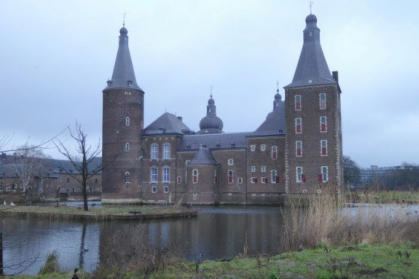
THE OLD CEMETERY IN ROERMOND.
A Daytrip to the Old Cemetery (from 1785) in Roermond: "Grave with the Hands".
Train from Maastricht’s platform 3 (train to Amsterdam), departs 28 and 58 past the hour to Roermond.
Duration of the trip: 30 minutes. Next take bus 80 from the bus station (final destination Koningsbosch) and
continue for four more stops. (10 minutes) by bus. Exit at stop: Bredeweg/Kerkhofweg. You could also take
bus 12 to stop “Kapel In ‘t Zand”.
In the Old Cemetery you will see a love story from the 19th century. It contains two monuments, named: "the
Grave with the Hands". What happened around the year 1840?? A young noble lady: Lady Josephine van
Aefferden fell in love with a commoner colonel in the army, Jacob van Gorkum, who happened to be 11
years her senior. In the 19th century this was a big problem. First: a noble lady was not allowed to marry a
commoner. Second: he was far too old for her. Third: she was raised Roman Catholic and he was raised
Protestant. There were limits. The couple experienced many difficulties and problems, as they were not
allowed to marry. Still they persisted and were married in Germany. They had a very happy marriage. Their
marriage lasted for 38 years, had 5 children and they stayed happy until Jacob died first.
In 1880 Jacob passed away and it was still not possible for them to be buried together, since the cemetery
was divided into five sections for all the different religions. Jacob had to be buried in the Protestant section
and Josephine in the Catholic section. Josephine buried him near the wall in the Protestant section of the
cemetery. People found that strange since there were better places there, but she had a plan.... She erected
a monument like a pole.
Eight years later Josephine died and was not buried in her noble family grave (can also be seen at the
graveyard), but..... right across the grave of her beloved husband, against the raised stone wall of the
Catholic section. There was a wall in between the Protestant and the Catholic sections of the graveyard!
People were amazed when a same type monument was erected like a pole, on her side. The solution to this
strange way of burying two people, who had loved each other their whole life, came with the final
monument: a male hand and a female hand holding each other over the wall in eternity. Isn't this a touching
love story? The monuments will be renovated this spring/summer (2015) but we hope they will be ready and
placed back before July 2015.
Another interesting grave is the one of Pierre Cuypers (1827 – 1921), a famous Dutch architect, who
built the Amsterdam Central Railway Station and the Rijksmuseum. He was born in Roermond, Limburg.
Another interesting grave is the grave of a Dutch Zouave: Mr. Küppers. A Zouave is a soldier in the
army of the Pope. In the 19th century the Pope was a warlord, trying to conquer entire Italy. In 1870 his
army was defeated by the freedom fighters of Garibaldi. Afterwards the Pope withdrew to the Vatican. The
soldiers of the Pope’s army wore fancy costumes inspired by the North African traditional clothing of that
time. That is why the present Swiss guard of the Vatican still wears fancy colored costumes.
Funny note: In Ineke's ancestry there were three brothers who served in the Pope's army in the 19th century
and survived. From the total of 22 Dutch Zouaves, 11 survived the Battle of Rome in 1870 and returned to
the Netherlands.
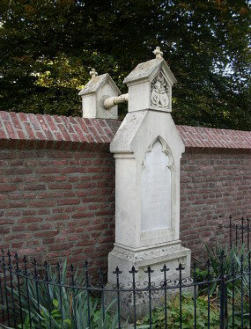

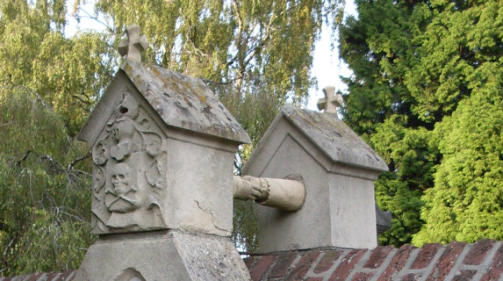
Pictures of the grave: by Frank Janssen. Below: Ineke’s ancesters.
A (full) day trip to the original “Red Rose Café” in Hoorn
(north of Amsterdam).
In 1976 Pierre Kartner wrote the famous song "The Red Rose Café",
also known as "The little Café on the Harbor". This song became
popular all over the world and numerous artists recorded it. In 2002,
André and the JSO also recorded "The Red Rose Café" and
presented the first copy of the CD to Pierre Kartner. The original Red
Rose Café is 't Schippershuis in the town of Hoorn! There they
have 178 different versions of the song available. In 2008 we did
organize a trip to Hoorn and the café. In 2012 we noticed a renewed
interest in visiting Hoorn and the café and we did a day trip again.
Right-click on the picture below to open the document with a full
description of this (full day) trip from Maastricht to Hoorn.
To save the document on your own computer, click the small floppy
disc icon at the top-left of the document.
You like to read more about the Song and the Café? In 2007 we
made a video clip of our visit to the Café: Click HERE. On Sonja's
Translations site there is another interesting article: Click HERE.

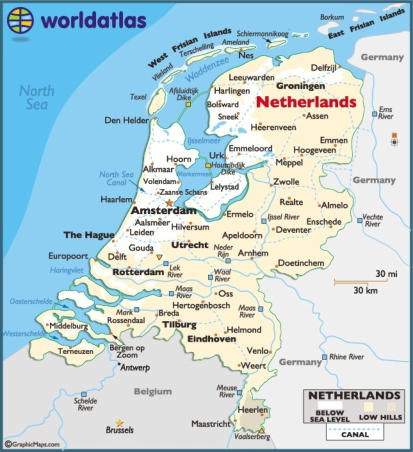
The one and only HUNDERTWASSER house in the Netherlands is in the South of Limburg:
in Houthem St. Gerlach, municipality of Valkenburg. Friedrich Stowasser was born in Vienna, Austria. He
changed his name to Hundertwasser. He lived from 1928 - 2000. He was a controversial artist: architect
and painter. He turned his buildings into pieces of art. No straight lines, colorful and green plants inside and
outside. He was convinced that people felt better there.

This is the Hundertwasser Ronald
MacDonald house in Houthem St.
Gerlach, municipality of Valkenburg.
It is a holiday resort for families with
special need children. It is named:
Childsvalley.
Doesn’t it look great??
Address: Onderstestraat 35,
6301 KA Valkenburg.
The video below will give you an impression of Maastricht and its surroundings.
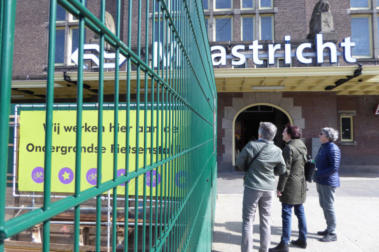
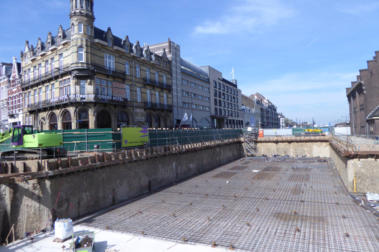
ATTENTION: Construction works in front of the Maastricht central station.
Currently (2016-2017) a huge underground bicycle parking facility is being constructed in front of the
Maastricht railway station. So when leaving the station, you’ll see a big hole in between the train station and
the Grand Hotel de l’Empereur. You’ll have to make a detour to the left to find the bus station, or you have
to make a detour to the right to find the taxi cabs. Hopefully the undergroud bicycle parking facility will be
completed at the end of 2017.
Gaia Zoo in Kerkrade.
An award winning Zoo. Only 30 minutes by car
from Maastricht. Address: Dentgenbachweg 105,
6468 PG Kerkrade.
Open every day from 10 AM.
Train departure from Maastricht railway station,
track 6, every 30 minutes at XX.59 and XX.29 to
Heerlen. Take bus 20 at the Heerlen busstation
with Kerkrade as final destination.
Exit after 25 minutes at busstop Gaia Zoo.
Admission Zoo: € 23,50.
Total travel time: approx. 1 hour.
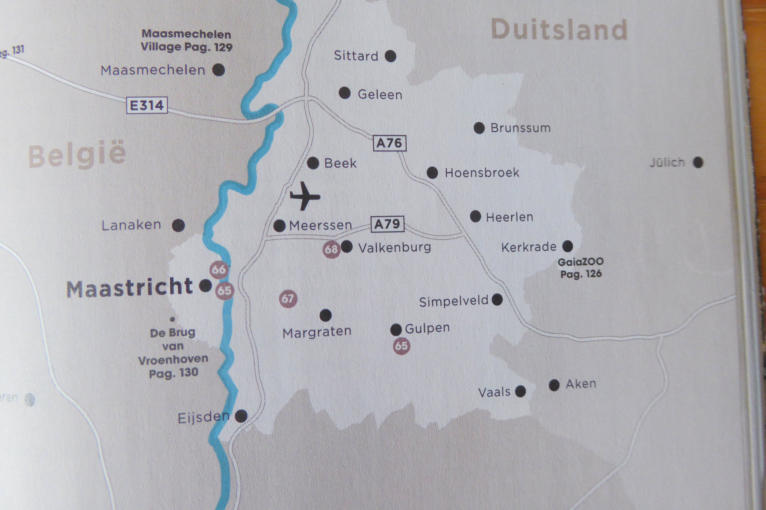
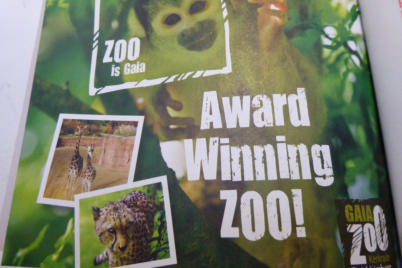
Brand spanking new Arriva train knows no borders.
Starting February first, 2019, transport company Arriva launches 8 new Sprinter trains between Maastricht
railway station and Aachen, Germany. The specialty of these eight new 3C sprinters is that they can use
electricity of three different voltages: 1,5 kV in the Netherlands, 3 kV in Belgium and 15 kV alternating
current in Germany. They can also travel with three different safety systems. It is the prelude to more
cross-border regional traffic.
The initial route will be Maastricht-Aachen in Germany. Liège in Belgium will follow soon.
Each train has 180 seats. Each train is equipped with kind of a "living room" equipped with long benches,
electrical outlets, wifi, air conditioner and USB connections. Dutch people can pay with their OV chipcard to
travel on these trains.
The Maastricht-Aachen route will take 60 minutes, with stops in Meerssen, Valkenburg, Heerlen,
Landgraaf, Eygelshoven, Herzogenrath and Aachen-West. At the Aachen Main Station you can change
trains to German cities like Cologne, Berlin, Frankfurt. German travelers can change the train in Heerlen to
travel to Utrecht and Amsterdam.


- Maastricht Dinnertime
- Maastricht Preparations
- Tickets & accomodation
- Ticket Mediation
- Trains from Amsterdam Schiphol
- Trains from Brussels, Paris, Frankfurt and London
- Maastricht Fan Dinner
- Maastricht Fan Picnic
- Maastricht City Walks
- Maastricht Mosasaurus
- Daytrips from Maastricht
- Vrijthof news
- Maastricht Bonbonniere
- Maastricht ENCI quarry

- 2026 - 2030
- 2021 - 2025
- Previous items 2025 Jul - Dec
- Maastricht 2025
- Previous items 2025 Jan - Jun
- Previous items 2024 Jul - Dec
- Index of this period
- Doctor Peter de Beer
- Phil Bee
- Carlo Bonnie
- André’s Castle De Torentjes
- André gets his own stamp
- Typewriter artist
- Duo X-Elle
- Cinema experience 2024
- Quote Business Magazine
- Concerts in Bogotá, Colombia
- Margriet Magazine (1)
- Margriet Magazine (2)
- André Rieu turns 75
- André’s 75th birthday party
- Concert in Milano
- Roadsoap 5
- Presentation of second biography
- Het Financieele Dagblad
- 2024 Christmas concerts
- Interview with Marjorie
- Interview with André Rieu
- Interview from Nous Deux
- Dorona Alberti looks back
- Maastricht 2024
- Previous items 2024 Jan - Jun
- Index of this period
- Kimberly Smith
- Amsterdam New Year's concert
- MAX Magazine
- Stradivari instruments
- Golden Carriage
- Bahrain concert
- Ineke's book
- Emma's birthday in Greece
- Organic carrots
- Mexico Illness
- New animated series
- Trio SAAMN
- Andre Rieu in cinema 2024
- Sculpture of Andre Rieu
- Making of the bull
- Book 75 year Andre Rieu
- Previous items 2023 Jul - Dec
- Maastricht 2023
- Previous items 2023 Jan - Jun
- Previous items 2022 Jul - Dec
- Index of this period
- December with André
- Ivo on Sunday
- World Record Academy
- Privé / Telegraaf
- Two Vienna concerts
- Pierre Kartner (Father Abraham)
- Shellfish from ENCI quarry
- Zagreb concert
- Great Maastricht Dictation
- South America Tour
- Tribute to Queen Elizabeth II
- Rose Festival in Lottum
- Photo exhibition William Rutten
- Fake tickets on sale
- L1 interview
- Rieu and the Royals
- Interview with Pierre Rieu
- Efteling News
- Announcement Christmas concerts
- Boundlessly popular
- Maastricht 2022
- Previous items 2022 Jan - Jun
- Previous items 2021 Jul - Dec
- Index of this period
- LINDA's Winterguests
- Max Verstappen World champion F1
- Lisbon concerts
- Christmas cinema movie
- Koffietijd program
- Christmas concerts 2021 postponed
- Mindfuck
- ARD1, Club1 program
- Promoting Portugal tour
- Limburg Central article
- Andre's birthday
- Kingsday 2022 in Maastricht
- Podcast: weird hit wonder
- NDR talkshow
- 10 Christmas concerts in the MECC
- Vera Russwurm interview
- Flooding benefit program
- Humberto interview
- Flooding in Limburg
- Two best friends, Andre and Andre
- Previous items 2021 Jan - Jun
- Index of this period
- Maastrichts dialect
- Playing again!
- OP 1 Interview
- Vrijfhof 2021 concerts postponed
- Covid Vaccinations
- EVC Congress
- Julia and Kathy
- L1 Interview
- 3 AW Nights interview
- Dutch Bake-Off
- Chinese Interview
- Rijsemus Violin builder
- Al-Jazeera Interview
- Blaaskracht
- PRESS info
- Happy New Year
- 2015 - 2020
- Previous items 2020 Jul - Dec
- Previous items 2020 Jan - Jun
- Previous items 2019 Jul - Dec
- Maastricht 2019
- Previous items 2019 Jan - Jun
- Previous items 2018 Jul - Dec
- Maastricht 2018
- Previous items 2018 Jan - Jun
- Index of first half 2018
- June 26th, VNG Congress
- May 13th, Duckrace
- May 12th, Professor Scherder
- May 11th, Time for Max
- Bulgaria concerts
- Fake Rieus
- April 2018, Tel Aviv
- East USA Tour
- MDR Um 4, March 26th,2018
- May 9th, Sandy beach radio
- Universal Music Award
- Semper Opern Ball
- New Years Concert Amsterdam
- Previous items 2017 Jul - Dec
- Lift-Off Splash Percussian School
- Index of 2nd half 2017
- Carmen Nebel show
- Christmas Events 2017
- Interview with Frank Michael
- Celebrity Radio interview
- UK Tour 2017
- USA Tour 2017
- German Tour 2017
- Q&A with fans on Facebook
- Sunday Night Interview
- Mexico Donation
- Day-Time in Maastricht
- RTL Helemaal het einde
- ARD Brisant
- NDR Tietjen and Bommes
- Making of Cinema video
- Maastricht 2017
- Previous items 2017 Jan - Jun
- Index of first half 2017
- Interview with Steven Wright BBC2
- Portrait of a Passion
- The "Real" Andre Rieu
- Welcome to my World 2
- Double interview Andre Rieu and Jo Cortenaedt
- Mirusia "From The Heart"
- Larura Engel "En Canto"
- Refugee brought Andre Rieu success
- Carla Maffioletti "A Dream"
- Venetian Carnival Revelers
- Golden Oldie from 1985
- Agnes Fizzano's shop
- Carnival speech Mayor of Maastricht
- Maastricht Pastry Route
- 2017 Valentines day
- Rieu plays in Semper Oper Dresden
- Linda Custers, Princess Carnaval
- New Years concert Ziggo Dome
- Ziggo Dome rehearsal
- Previous items 2016 Jul - Dec
- 2016 Jul - Dec, Index
- SBS6 Stars Surprise Show Dec 21st, 2016
- Liverpool december 2016
- Magic Maastricht 2016
- BBC Breakfast Today Show
- ARD Advent Show
- Two Million Likes
- CinemaLive Christmas
- SWR 4 German TV
- Strictly Come Dancing
- The meaning of life
- Leute Heute
- Dancing with the Stars
- In Conversation
- Free Mini Concert in Maastricht
- L1 Radio Interview
- Josti Band 50 years
- NDR Talk Show
- New Maastricht Salon orchestra
- Rieu in Cinema
- Maastricht 2016
- Previous items 2016 Jan - Jun
- Previous items 2015 Jul - Dec
- 2015 Jul - Dec, Index
- Rieu entertainment
- Dec. 2015, Bild Star Magazine part 4
- Dec. 2015, Bild Star Magazine part 3
- Dec. 2015, Bild Star Magazine part 2
- Dec. 2015, Bild Star Magazine part 1
- Nov. 17th, 2015, RTL Boulevard
- Nov. 12th, Shownieuws
- Nov. 16th, Loose Women
- Oct. 30th, Colectiv Club Fire, Bucharest
- Roman Holiday (3)
- Roman Holiday (2)
- Roman Holiday (1)
- Oct. 26th, Classic FM Q&A
- Oct. 23rd, MDR at 4 PM
- Oct. 10th, Jubilee Award
- Sep. 19th, 2015, Carmen Nebel
- Maastricht 2015
- Previous items 2015 Jan - Jun
- 2015 Jan - Jun, Index
- Code M, the movie
- Bucharest Concerts Part 1
- Bucharest Concerts Part 2
- A Latin Breeze
- Maestro without borders
- Copenhagen Concert
- Brazilian Fans
- George Harper In Memoriam
- Press Conference Romania Open Air Concerts
- RTL Late Night Show
- AvroTros TV Show
- Cologne Concert
- Valentine's day
- Tempeleers Carnaval Medal
- Markus Lanz Talk Show
- 2007 - 2014
- Previous items 2014 Jan - Jun
- Maastricht 2014
- Maastricht 2014, The Preparations
- Maastricht 2014, (Dress) Rehearsal
- Maastricht 2014, The Concerts
- Maastricht 2014, Fan Dinner
- Maastricht 2014, Three Fan Picnics
- Maastricht 2014, Lift-Off
- Maastricht 2014, Exhibition Marc Rieu
- Maastricht 2014, Our Story Page 1
- Maastricht 2014, Our Story Page 2
- Maastricht 2014, Venetian Carnival, the making of
- Previous items 2014 Jul - Dec
- Previous items 2013 Jul - Dec
- Advent Calendar 2013
- Spirit of Christmas
- Nelson Mandela
- Movie Marina
- BBC Breakfast Show
- German TV programs (1)
- German TV programs (2)
- L1 Late November 5th, 2013
- RTL Boulevard, October 31st, 2013
- Amira Willighagen
- Evenblij with....
- Australian tour 2013
- German TV Sept.2013
- ORF Vera Russwurm
- Jean-Philippe composes ode to Mary
- Tietjen and Hirschhausen 2013
- Rieu to play on North Pole?
- Maastricht 2013
- Previous items 2013 Jan - Jun
- RTL Boulevard June 19th, 2013
- Jean-Philippe's children's books
- What I know about women
- AR-Academy
- Copenhagen concert
- SkyArts2
- Limbourgeois April 30th
- The making of the Coronation concert
- King's inauguration Day 2
- King's inauguration Day 1
- King's Waltz
- Charity TV broadcast
- classicFM interview
- Trini Lopez
- Jean-Philippe's book
- Jermaine Jackson
- Dutch Queen Abdicates
- history fan websites
- Cologne, Jan.1st 2013
- Previous items 2012 Jul - Dec
- Limbourgeois 25 December 2012
- Chistmas in Birmingham
- Linda Magazine, December 2012
- Advent calendar
- Cinema Heerlen 2012
- Boulevard Nov 21, 2012 and Ajax
- André's Birthhouse
- UK TV Programs November 2012
- Classic Brit Award
- Andre in Brazil 2012
- Interview Dolman Rieu
- BVN Trophy 2012
- Westland Fruit and Flower parade
- L1mbourgeois August 19, 2012
- Maastricht concert 2012
- Previous items 2012 Jan - Jun
- Previous items 2011 Jul - Dec
- Maastricht 2011
- Previous items 2011 Jan - Jun
- The person behind the phenomenon
- Andre and Hopkins
- Interview in Vienna
- Frank Steijns and "Normaal" band
- PBS visiting Maastricht 2006
- Amsterdam ArenA 2011
- Pierres Hobby
- DWDD May 26th, 2011
- Madiwodovrijdag show
- André Rieu and Anthony Hopkins
- Mirusia DVD release
- Scary moments in South Africa
- BUMA Export award 2010
- Interview with Mirusia
- WDR swap reporter
- Previous items 2010 Jul - Dec
- Platin Tenors at the Cologne Christmas market
- Koffietijd December 20th, 2010
- Christmas concert by Mirusia
- Today Show December 18th, 2010
- Ice Sculpture Maastricht 2010
- The André Rieu Story
- UK November 2010 appearances
- Mexico City, November 28th, 2010
- Ivo Niehe interviews André Rieu after his illness
- André is Back!!
- LeuteHeute 151110
- André is rehearsing again
- First interview after sickness
- André cancels UK and Aussie 2010 tour
- Jubilee book 30 years André Rieu
- Interview with Pierre about André's ilness.
- Three hours marathon interview
- André escapes Toronto
- Previous items 2010 Jan - Jun
- Maastricht 2010
- Maastricht Winery, South Africa
- The best of Thirty Years André Rieu
- Mainau 2010, "Roses from the South"
- Dancing on Ice, 2010 UK finals
- Maastricht Stampsheet
- André to play for Queen Beatrix of The Netherlands
- At home with Bela Mavrak
- Export award 2009
- Farewell mayor Leers
- Flikken Maastricht
- Cologne 2010 concert
- Previous items 2009
- André and Friends ArenA 2009
- André's 2009 Christmas interview
- Christmas with Carmen Nebel
- Frank Steijns carillon
- Dutchman of the Year 2009
- Royal Variety Performance
- Brisant
- Dreams come true
- André's twins
- MDR André 60th birthday interview
- Sydney Oct.2009
- Ivo Niehe's interview with Mirusia Louwerse
- Maastricht Liberators
- Heidelberg September 2009
- Maastricht 2009, the concert
- Maastricht 2009 update
- America Tour 2009
- The week of André Rieu
- André in Villa VANTHILT
- Boulevard and Knevel and van den Brink
- André Rieu about New York
- Carmen Nebel in Maastricht
- André named best selling male artist
- André Rieu Stamp Booklet
- Maastricht 2009
- Interview with André on RTL9
- Marc Rieu, the other son
- Andre Rieu on his way to Australia
- André and Vegemite
- Ruud and Ineke meet Kathi (Caramia)
- Road Soap review
- André in de ArenA
- André get awards
- Good afternoon Limburg
- van der Vorst ziet sterren
- Previous items 2008
- Australian interviews with André
- Holiday in Australia
- Ivo Melbourne
- From Maastricht to Melbourne
- Interviews December 2008
- Melbourne Concert 2008
- Trier 2004
- Dresden
- Kerner and Nebel
- Maastricht but different
- Maastricht Vrijthof concert 2008, the highlights
- 60 Minutes, André Rieu and Andrea Bocelli
- Maastricht 2008 concert
- Aussie Interviews
- André in Ottawa
- Andre Rieu Tulips in Ineke's garden
- Ovation-Schofield
- De Rode Loper
- Boulevard
- Riverboat
- The Last Show
- Benny Neyman
- Ivo Niehe March 2008
- Kruispunt
- Tietjen and Dibaba
- Toronto by Alice Leung
- Toronto 2007
- Cologne 2008 concert
- Previous items 2007

- Agnes Fizzano-Walter
- Anna Majchrzak
- Anna Reker
- Annabelle Traves
- Béla Mavrák
- Bibi Ortjens
- Boris Goldenblank
- Brass section
- Carla Maffioletti
- Carmen Monarcha
- Christina Petrou
- Cord Meyer Leusink
- Donij van Doorn
- Els Mercken
- Emma Kok
- Frank Steijns
- Gary Bennett
- Gosia Tarnowski
- Gracenotes
- Jean Sassen
- Joline Soomers
- Justinas Kaunas
- Kimmy Skota
- Kremi Minerva
- Laura Engel
- Lift-Off (Marcel Falize)
- Marcel Falize (1)
- Maja Jasinska
- Maastricht Salon Orchestra
- Manoe Konings
- Michaela Oeste
- Michel Tirabosco
- Mirusia Louwerse
- Night of the Proms
- Pierre Rieu
- Platin Tenors
- Rene Henket family
- Roger Diederen
- Ruud Merx / Lin Jong
- SAAMN trio
- Sanne Mestrom
- Serena Vanheuverswijn
- Stéphanie Detry
- Suzan Erens
- Tanja Derwahl
- Tiroler ohne Berge (Marcel Falize)
- VerrasSing
- Vincenzo Viola

- 2000 - 2009
- 2009: Andre meets Mr. Wijdbeens
- 2006: Josti Band
- 2006: Profiel
- 2005: Art Express Classic
- 2005: Interview with Catherine Keyl
- 2004: Portrait of a Passion
- 2004: André van Duin meets André Rieu
- 2004: Trier concert
- 2004: Rehearsal for Tros 40 year song
- 2003: Barbara Wussow
- 2002: TROS Cruise
- 2002: Barend en van Dorp
- 2001: José Carrera Gala
- 2001: The Ländler
- 2001: Open House
- 2000: BZN meets André Rieu
- 2000: A Dream Come True
- 1989 - 1999
- 1999: Andre @ Spanish RTVE
- 1999: Laat de Leeuw
- 1999: Alfredissimo
- 1998: Lesley Garrett
- 1998: Celebrities
- 1998 Early JSO
- 1997: Strauss Party - Kiel
- 1997/98 Bill's oldies 2
- 1997/98 Bill's oldies 1
- 1997: Im Krapfenwald
- 1996: Snow White, a fairytale
- 1996: André Rieu "In Concert"
- 1996: Charity Concert
- 1995 André and André
- 1995: Wiener Melange - Lübeck
- 1995: Karel van der Graaf
- 1995: Musikantenstadl
- 1995: TROS Op nieuwe toeren
- 1995: Carré Theatre (The Vienna I love)
- 1995: Veleta
- 1995: TVcommercial/A.van Duin
- 1995: First videoclip
- 1995: Angela's Challenge
- 1994: Schutterij EMM Ooy
- 1994: Strauss & Co
- 1994: Olympic Stadium
- 1992: Before he got famous
- 1989: Tineke's TV years
- Tour Programs 1987/88
- Tour Programs 1994/95
- 1985














